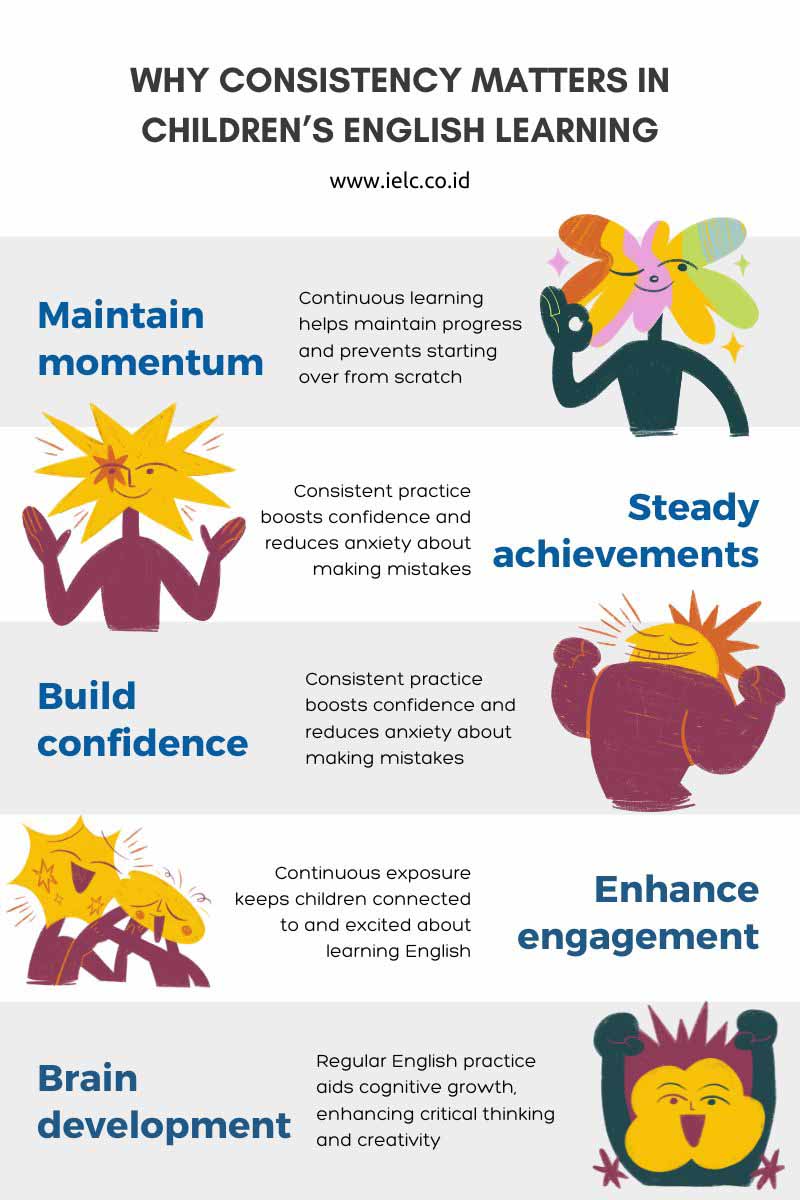
When is it a good idea for kids to take a break from English lessons?
So, you enrolled your child in an English course…and you’re starting to see great results. They’re improving and becoming more confident. And you’re starting to feel like a smart parent!
But over time, they start to lose motivation. And their schedule is becoming more packed…with homework, music lessons, art lessons, math lessons, football, basketball…and don’t forget increased screen time on their digital gadgets!
You may be thinking…”exams are coming up…what are we going to do? I want my kid to do well at school. How about we just take a break from English lessons until exams are finished…”
Surely that’s okay…, right? After all, it’s just a temporary break!
While taking short breaks (a few days to a couple of weeks) can sometimes be helpful, you should think twice before taking a break longer than this.
Studies have shown that pauses in learning can have a serious impact on the quality of learning and the final outcome.
In fact, learners who take frequent breaks during their language study fall far behind learners who maintain consistency throughout their studies.
There is definitely one situation where you should give your kids a break from English lessons and you’re going to want to read until the end of this article to find out.
But first we’re going to discuss 5 reasons why taking a break isn’t a good idea…

1. You child starts to forget what they learned
Let’s start with the obvious one. If your child takes an extended break, they will start to forget what they have learned.
Learning happens via repetition. So if your child takes a break… they quickly lose the things they have already learned and memorized!
We store information in our brains via a network of cells called neurons. When your child learns something new, the neurons associated with this activity become excited. These neurons grow tentacle-like dendrites, which are used to receive information.
So the more they learn, the more these dendrites are used and the stronger they become.
However, when they take a break from learning, these dendrites become weaker, making it more difficult to retain knowledge.
So, do be careful if you decide to postpone your child’s English lessons…you don’t want them to have decaying dendrites!
2. They lose momentum
Just imagine your child learning English and gaining momentum. They start getting better and better. But then you decide to give them a break…what do you think will happen?
Well, they’re going to lose momentum!
Momentum is like Newton’s first law of motion: “an object at rest stays at rest and a moving object keeps moving at a constant speed unless acted upon by an external force”.
In other words, it is much easier to keep moving once they have momentum than to start from scratch.
And the more momentum they have, the faster they go.
It’s much harder to get momentum going after a break. Parents of students who have taken breaks always tell us how hard it is to get their kids started again.
There is a clear reason why kids develop resistance during break. They start to lose confidence. They start to worry that they have fallen behind their friends.
Believe me, this has happened to my children. Feeling like you have to start something from scratch again can be even harder than starting the first time.
3. They lose confidence
Just imagine, your child is taking English lessons and growing in confidence day by day. They begin to grasp the material faster as they gain progress, which makes them even more confident.
But then they take a break and what happens to their confidence?
It takes a big hit.
We have seen this again and again. When kids take breaks, they lose confidence. And when they start again, it takes them a long time to rebuild their self esteem.
Speaking English is a confidence game. It’s hard to build up but easy to take down. And self confidence is so important to the language learning process.
Kids need to have the confidence to make mistakes and keep trying. If they lose this confidence because they took too many breaks, it causes too much disruption to their learning process and becomes hard to repair.
4. They stop thinking in English
You might not realize this…but studies show that during lessons, your child begins to think in English.
And the more lessons they have, the more they start to think in English. In fact, they even begin to think in English outside of class.
This is one of the major differences between children learning English vs adults learning English. When we start learning English as an adult, our minds reference our native language. In effect, our minds translate from our own native language into English.
Children are different, they have a greater ability to start thinking in English. This is an unbelievable gift.
But when they take a break from classes, they lose their ability to think in English. And English starts to become a foreign language again.
This is why it’s so important not to give your kids extended breaks from learning English. It actually affects their mind.
5. Their level drops
When we stop doing exercise, our fitness actually drops.
Similarly, when our kids stop learning English, their level can actually drop. It’s not like it stays the same level and they can pick up where they left off.
It becomes even worse if they originally studied in a group class and when they return to that group, their friends have advanced to a more complex level while they stayed stagnant or even regressed.
This is the number one reason that kids who take breaks give when they don’t want to start their lessons again.
6. Their cognitive development slows down
When we talk about our children learning a language like English, it’s so much more than just picking up new words and grammar!
It’s about shaping their minds, their ability to think, solve problems, and understand the world. Regularly engaging in language learning is like a workout for the brain – it boosts memory, enhances problem-solving skills, and sharpens critical thinking.
Now, imagine if this workout stops. Taking an extended break from learning a language isn’t just a pause in acquiring new vocabulary or mastering grammar. It’s potentially halting their cognitive growth. Just like muscles that aren’t exercised regularly can lose strength, a child’s cognitive abilities, nurtured through language learning, can start to weaken during a long break!
This isn’t about instilling fear, but understanding reality. When children are regularly exposed to language learning, their brains are continually forming new connections, getting stronger and more efficient in processing information and solving problems.
These are skills that go way beyond the classroom, skills that they carry into every aspect of their lives!
7. They lose motivation
Remember the excitement, the eagerness, and the pride in your child’s eyes when they first started their English lessons?
That initial burst of enthusiasm is a testament to their intrinsic motivation, fueling their journey through the twists and turns of learning a new language!
But, what if this journey hits a prolonged pause?
An extended break from their English lessons can gradually dim this intrinsic motivation. It’s a subtle yet significant shift. They start losing not just the knowledge they’ve gained but also their connection to the excitement and culture of the language and the learning process!
It’s like taking a break from a good book. The longer you leave it, the harder it is to remember why you were excited about it in the first place. And for kids, whose interests and passions can shift like the wind, rekindling that interest in English after a long hiatus can be a real challenge!
8. Their progress and satisfaction stall
Picture your child’s journey in learning English as a series of exciting discoveries and milestones. Each new phrase they master, every grammar rule they understand, brings a sense of achievement that goes far beyond language learning. It’s a powerful boost to their self-worth, a reinforcement that they can conquer challenges and excel!
Now, let’s pause and think about what happens when we put these little victories on hold with an extended break. It’s not just a matter of stalled progress in learning English. There’s a deeper layer here, often unseen but keenly felt: the delay in gratification and achievement.
Think about it like this: every step forward in their language learning is a brick in the foundation of their confidence. They’re building something grand, not just in English, but in their overall approach to challenges and achievements. A prolonged break can slow down this building process, delaying the gratification that comes with each new learning milestone.
This might cause them to start to doubt their abilities, not just in English, but in other areas too, as the momentum of regular achievements fades away.
So, let’s strive to make their English learning journey an exciting adventure, filled with moments of triumph that will boost their confidence and keep their motivation soaring high!
So when should they take a break from learning English lessons?
After reading the above points, I’m sure you’re thinking “I bet you’re gonna say it’s never a good time to take a break”.
Well, actually, there are some situations when it’s best to take a break from English lessons.
When they have a bad teacher
The number one reason to take a break from English lessons is when your child has a bad teacher. Bad teachers actually harm your child’s confidence. They teach them bad habits that are very difficult to unlearn later on.
Unfortunately, we have seen this too many times. When students join us after having a bad teacher, they have often developed very bad habits. Their pronunciation is bad, their grammar is messy, and their confidence is low.
Summary
In this article, we have explained the risks of taking an extended break from their English lessons.
We also discussed the one reason they should take a break from lessons.
We hope you enjoyed this article. If so, please share with other people who you think would benefit from reading it.
Next steps…
Many Indonesian children lack confidence when they speak English. They are worried about making mistakes and are embarrassed to speak English in front of others.
This is because they have been taught English the wrong way.
At IELC, we teach English the right way so your child can express themselves with confidence and fluency. Whether it’s online or on campus, we create a positive learning environment where your child will feel warm and welcomed, where they can learn and have fun at the same time.
The best English course for kids in Indonesia
With so many courses available, it can be confusing to know which course to choose.
With an average rating of 4.9 out of 5.0 stars on Google, IELC is the highest ranked English language course in Indonesia.
We teach English the right way so your child can gain confidence and fluency.
With these skills, they can unlock their potential and fulfill their dreams!
Our experienced teachers guide your child along every step of the learning process to ensure the best learning outcome.
As Indonesia’s #1 English campus, we offer great courses for kids, teens, and adults:
- Online courses for kids
- Online courses for teens
- On campus courses for kids
- On campus courses for teens
Whether it’s online or on campus, we will help your child gain the skills they need for their future. Contact us to start your child’s journey towards confidence and fluency today!
Sincerely,
Anthony McCormick
IELC Managing Director.
